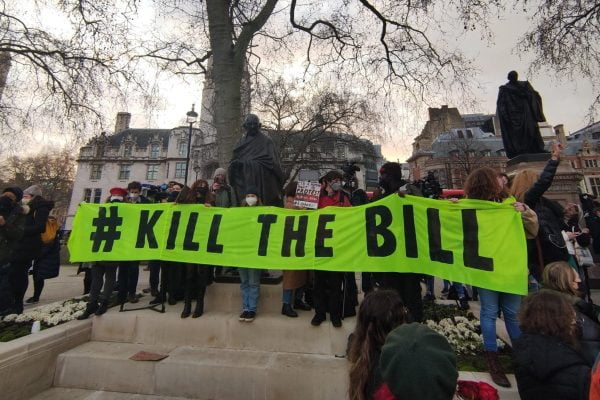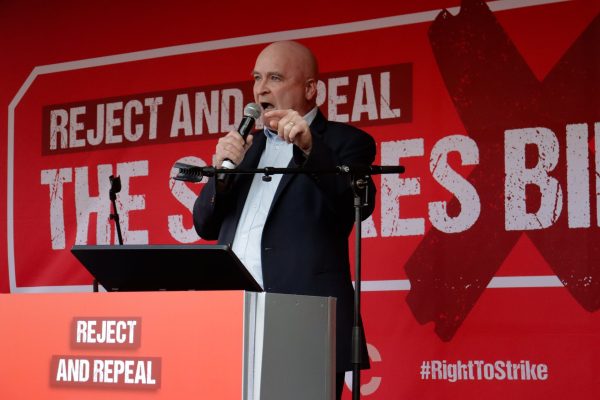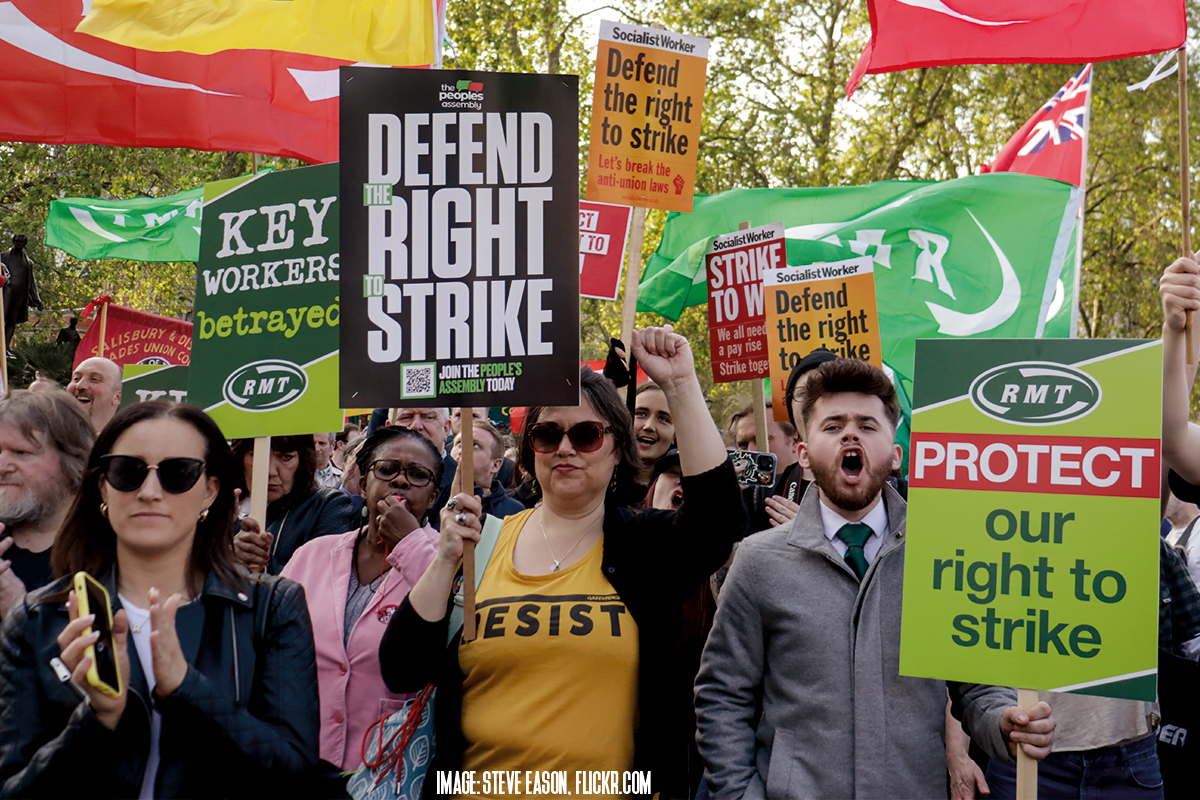Yesterday, 22 May, saw the final reading of the government’s proposed Minimum Service Levels Bill in the House of Commons.
In reality, this is a set of anti-union laws, brought in by the Tories on behalf of the bosses. This new legislation will effectively take away the right to strike from an estimated 1 in 5 workers in Britain, by imposing staffing requirements in key public services such as transport and health.
The law, as expected, was passed in the Commons. It will now go back to the House of Lords.
MPs also voted down amendments proposed by peers that were designed to soften the impact of the bill.
These changes are likely to be finally enacted in the autumn, or possibly sooner. There is no time to lose.
To defeat this bosses’ charter, the whole trade union movement must launch a mass campaign unlike anything seen for generations, and militantly defy these Tory laws.
Division
After initially passing its second reading in the Commons back in April, the bill was subject to a number of amendments proposed by the unelected House of Lords.
 This included making the legislation applicable to England alone, and removing the threat of dismissal for failure to comply with minimum service work notices (the means by which the law will be imposed on the shopfloor).
This included making the legislation applicable to England alone, and removing the threat of dismissal for failure to comply with minimum service work notices (the means by which the law will be imposed on the shopfloor).
The Lords also proposed that a full legal consultation should take place prior to the bill’s implementation, and that the threat of action against unions that encourage workers to defy the law should be dropped.
Tory MPs voted down all these amendments, however. But the fact they were even put forward in the first place, in order to curb the bill’s powers, shows how divided the establishment is over this draconian move by the government.
The bill will now go back to the Lords, who may put forward the same – or further – amendments, as is standard procedure in the institutions of British bourgeois democracy. This means that the legislation could be tied up in parliamentary procedure for some while yet.
This will buy the trade union leaders a bit of time. This must not be squandered.
What is required is a mighty movement to smash not only this law, but all the anti-trade union laws – and to topple the Tories from power for good.
Repression
This is not the only repressive bill that has passed in Parliament recently, designed to restrict the democratic rights of workers.
At the end of April, for example, the Public Order Act was passed. This gives new powers to the police to clamp down on protests – even before they actually take place!
This was used with glee by coppers during the recent coronation celebrations, in order to arrest anti-monarchy protestors. And there is no doubt that the police will be prepared to use this very same law against trade unionists, in due course.
 This all comes on top of the notorious Police, Crime, Sentencing, and Courts Bill.
This all comes on top of the notorious Police, Crime, Sentencing, and Courts Bill.
The very fact these new laws are being introduced now – in quick succession, one after the other – reveals the anxiety amongst the ruling class.
They fear the rising number of protests and strikes that are taking place, as workers and youth take to the streets to fight back against the Tories, the bosses, the polluting monopolies, and more – in short, against the crises of capitalism.
These laws are further proof that the ruling class, faced with instability and intense class struggle, will increasingly reach for the repressive powers of the state to try and quash dissent.
Once again, this reveals the real role of the capitalist state, the courts, and these ‘armed bodies of men’: to protect the property, profits, and power of the ruling class.
Protest
In response to the latest debate on this bill in the Commons, the TUC organised a demonstration outside Parliament last night (Monday evening).
Socialist Appeal activists were present there, speaking to workers and trade unionists about how we can defeat these Tory laws.

Comrades reported that demonstrators were focussed around drumming up support for continued industrial action and defiance, as opposed to any hopes that this bill could actually be defeated in Parliament.
Many of those present stated that they expected the bill to pass, and that the protest was more a way of maintaining momentum. What will actually be required to defeat this draconian attack is a mass movement of the working class.
This mood conflicted slightly with the speeches in Parliament Square, however. TUC general secretary Paul Nowak, for example, simply spoke about the need to keep up the pressure on MPs, receiving a lukewarm response.
Nowak also spoke about ensuring that the next Labour government repeals these laws, which the party has reportedly committed to doing. But workers know that in Starmer’s Labour, words are cheap, and promises are not worth the paper they are written on.
Whatsmore, as Onay Kasab of Unite stated at Monday’s rally: “It’s great news that a Labour Party, if and when elected, will repeal this legislation. But our members want them to go further.”
“Don’t just repeal this legislation,” the Unite official correctly demanded. “Repeal all the anti-trade union legislation!”
Defiance
Nowak added that the TUC would challenge the law “legally and industrially”, as they have done so far, and will likely continue to do. But all the emphasis is on the former.

The TUC leaders intend for this bill to be fought predominately through the courts. But the legal system is not neutral. Ultimately, the courts and judges will always operate in defence of the bosses.
At the end of the day, the outcome will be decided on the streets, not in the courts; by militant action, not moral appeals or an understanding of legal procedures.
In reality, the working class has the upper hand. To realise this full potential strength, however, requires organisation and mobilisation.
This was the message presented by union leaders like Mick Lynch. “It doesn’t matter what laws they put in front of us,” the RMT general secretary bellowed from the podium. “The message from tonight is that we’re going to keep going!”
“We will not obey work notices. We will defy this law!” Lynch continued to huge cheers. “And if this law comes into fruition in the autumn, or whenever it comes, the TUC and all of the trade unions affiliated, and every worker in this country, has got to unleash a mass campaign of workplace disobedience and defiance!”
Mobilise
These fighting words are 100% correct. The TUC must now translate them into deeds, and begin seriously organising such a campaign.
From the TUC general council, to the branches of its constituent unions: the entire labour movement must rise up against these bosses’ laws.
The aim should not simply be to defeat this one bill, but to smash all the anti-union laws.
On this basis, with the whole of the organised working class mobilised, we could drive the Tories out for good, overthrow the bosses’ system, and put workers in power, in order to end the exploitation, repression, and misery of capitalism once and for all.






